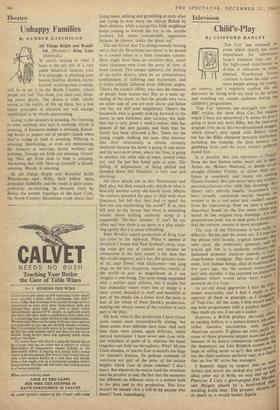Theatre
Unhappy Families
By BAMBER GASCOIGNE All Things Bright and Beauti- ful. (Phoenix.)—King Lear. (Aldwych.)
IF you're writing at what I hope is the tail end of a very jaded theatrical fashion, your first principle, in planning your honest, fearless, plotless, warm- hearted working-class comedy,
will be to set it in the North Country, where people are real. This done, you must start think- ing about details. The choice is wide, chiefly owing to the reality of life up there, but a few minor principles of selection are well enough established to be worth enumerating.
Going to the lavatory is amusing. Not listening to what anybody else says is amusing. Drink is amusing. A fearsome mother is amusing. Knock- ing books or papers out of people's hands when they're trying to read is amusing. Pilfering is amusing. Mentioning, or even not mentioning, the lavatory is amusing. Social workers are amusing. Tramps are Irish are amusing. Growl- ing 'Shut up' from time to time is amusing. Answering that with 'Shut up yourself' is bloody amusing. Bloody is amusing.
In All Things Bright and Beautiful Keith Waterhouse and Willis Hall follow these principles faithfully and the result is quite extra- ordinarily un-amusing. In between visits by Baloo, the earnest organiser of the local Cubs, the North Country Hesseltines crash about their
living room, striking and grumbling at each other and trying to stow away the objects filched by their children, while a tramp-like Irish neighbour keeps coming to borrow the key to the outside lavatory but meets considerable opposition because he always 'stinks the place out.'
The one factor that I'm disingenuously leaving out is that the Hesseltines are about to be moved to a council estate in a slum clearance scheme. Here might have been an excellent play, about slum clearance seen from the point of view of those cleared. This unique upheaval, the shifting of an entire district, must •be an extraordinary • combination of suffering and excitement, and it looks entirely different from different angles. There's the council officer, who sees the removal of people from houses into flats as a mere up- ending of the street, so that the people who were on either side of you are now above and below you but are still your neighbours. There's the housewife who is greatly looking forward to the move, to new furniture, new curtains, but finds that she is only given a week's notice; who has dreamt of her new garden, and finds that the family has been allocated a flat. There are the young couple, walking out now, who discover that their relationship is almost certainly shattered because his street is going to one estate and the next-door street, where she lives, is going to another, the other side of town, several miles out, and the last bus home goes at nine. The feeling of helplessness, of being shifted and dumped down like furniture, is very real and alarming.
All these details are in this Waterhouse and Hall play, but they remain only details in what is basically another corny old family farce. Maybe the authors intended the play to deal with slum clearance, but felt that they had to spend the first two acts establishing 'the mood'? If so, they fell prey to the heresy that there is something artistic about drifting aimlessly along in a supposedly life-like' manner. It can't be too often said that there is no harm in a play admit- ting openly that it is about something.
Peter Brook's superb production of King Lear has come to the Aldwych. When it opened at Stratford 1 found that Paul Scofield's deep, rasp- ing voice got out of control and became an obstruction in the later scenes. I felt then that this would improve, and it has. His greatest scene of all, near Dover with Gloucester—one long elegy on the lust, hypocrisy, injustice, cruelty of the world--is now as magnificent as I can imagine it ever being. The scene hangs suspended with a perfect quiet stillness, like a simple but fine chandelier where every line or image is a clear crystal, beautiful in itself and beautiful as part of the whole. On a lower level the same is true of the whole of Peter Brook's production, making one always aware of the relation of each part to the play.
On both visits to this production I have found some scenes most extraordinarily elating, but these scenes were different each time. And each time there were scenes, again different, which seemed wearisome. I have never seen Lear with- out weariness at parts of it, whereas the lesser tragedies can hold me throughout. Why? Maybe I lack stamina, or maybe Lear is secretly too huge for anyone's stamina. Or perhaps moments of weariness are part of the price of the unique heights which Lear at times reaches? I don't know. But whatever the reason (and the weariness may be peculiar to me), the fact that the moments are different on different visits is a tribute both to the play and to this production. This Lear mustn't be missed—but it will be by anyone who doesn't book immediately.




























 Previous page
Previous page